Story
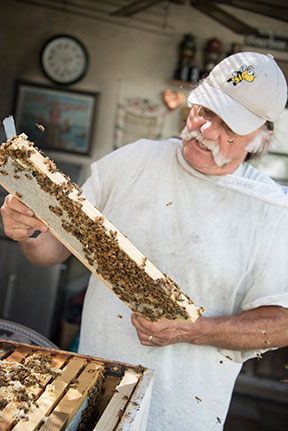
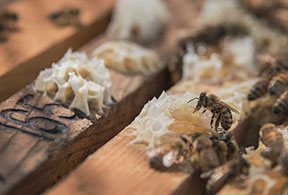
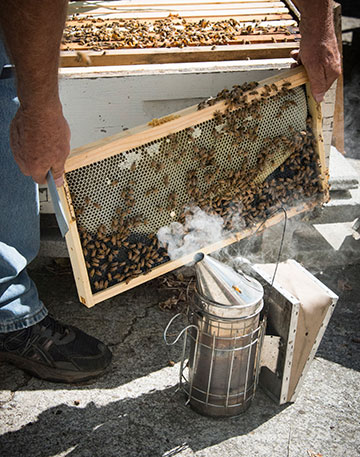
Hundreds of bees swarmed around a backyard on the 2500 block of Pioneer Avenue in San Jose, flying into and out of wooden boxes containing dozens of hives. Despite the overwhelming presence of the bees, the neighbors don’t complain.
The hives belong to Mike Stang, a member of the Santa Clara Valley Beekeepers Guild and an urban beekeeping advocate. He said when he first started keeping bees, his neighbors were anxious, having heard horror stories of “killer bees.” But they came around when they tasted the honey he gave them and started noticing how much more fruit their trees were yielding — Stang’s trees were heavy with nectarines, grapes, lemons and plums in early July. Once Stang educated his neighbors about bees, telling them bees are little threat to people unless, like any animal, they are provoked, he said they were supportive.
“It is kind of a spiritual thing,” Stang said, pulling out a rack of honeycomb from a screen containing a hive, hundreds more bees covering his hand as he ran it along the surface of the swarm like an owner gently petting a dog.” Everything about beekeeping and bees is beneficial to humans.”
Stang makes many of those beneficial things his livelihood. In addition to selling and removing what he calls “hot hives,” i.e., hives that have become agitated and are therefore dangerous, Stang sells honey and soaps, lotions and other beauty products made from beeswax.
But not everyone is as comfortable with having droves of bees buzzing around near their home, where their children and pets play, and regulations on beekeeping aim to strike a balance between entrepreneurial spirit and public wellbeing.
Still, Sang is critical of urban beekeeping laws regional that place stringent regulations on how many hives a person can keep and specifies that those hives must be at least 1,000 feet from neighbors’ properties and public spaces such as schools; saying that much of public hysteria is overblown and so-called “nuance” laws stem from ignorance. Stang said the laws that regulate people keeping hives on their property are archaic and out of touch with the current culture surrounding the hobby.
Further, bees are essential to our environment, he added. And others agree. In May, several fellow guild members, including Ken McKenzie, president of the guild attended a Santa Clara City Council meeting and implored them to change the City’s ordinance. Many beekeepers, such as Stang and McKenzie, operate outside the law and would like to see city regulation broaden their ability to practice their hobby, so they can “come out of the closet.”
“Regulation needs to be more sensible because regulation is a benefit to our planet,” Stang said. “But we need honeybees. If they die, we die.”
McKenzie detailed the reasoning for such statements at a beekeeping workshop earlier this summer at McClellan Ranch Preserve, Cupertino.
Bees are critical to crop pollination, McKenzie said. However, in recent years, their population has dwindled drastically. Stang and McKenzie both said they lost roughly 60 percent of their hives last year, and discussions with fellow guild members revealed that number is the norm, not an anomaly.
The problem is a parasitic mite from Asia that destroys the hives at an alarming rate. Beekeepers don’t yet have a solution to the problem. Also, McKenzie said, that current food production is so geared toward European honeybees, that scientists don’t study the potential of the native populations. Deregulating urban beekeeping would be similar to having dozens of incubators around Silicon Valley which would help diversify the ownership of bees, keeping them more insulated from mites and allowing beekeepers to learn about non-native populations.
“It is not necessarily the bees’ problem. It is our problem,” McKenzie said. “Bees are significant to our food source.”
It appears as if the Santa Clara City Council has heard these concerns. Following the May meeting, Diana Fazely, deputy city attorney, began drafting an amendment to the city code that would allow residents to keep bees.
The draft of the ordinance allows residents to keep two hives on their lots and limits the proximity of neighbors’ homes and public streets to 20 feet. The new ordinance would also allow beekeepers to keep hives on rooftops.
“We are making it easier for residents to keep bees on their lot,” Fazely said.
Fazely said she looked at cities with that allow beekeeping such as San Jose, Sunnyvale and Santa Monica, and that information, coupled with the comments at the May Council meeting, helped her craft the language and parameters of the ordinance. The impetus for the ordinance was largely complaint driven, she said, as “several” people called the mayor’s office to voice their concern for the rules to change.
Those keeping apiaries must register with the Santa Clara County Agricultural Commission, according to the ordinance. If found in violation of the ordinance, the city will issue a written warning for two days before issuing a citation. Failure to comply could then result a $1,250 fine and up to six months in jail.
More than two hives are permitted with permission of the City Manager on a case-by-case basis. However, the ordinance does not specify what criteria the City Manager will use in determining which apiaries to allow.
The council vote on the ordinance at its Aug. 23 meeting, which will be held 7 p.m. in the Council Chambers at 1500 Warburton Ave.





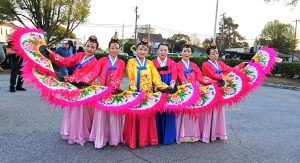

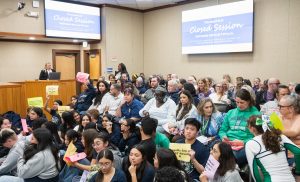




0 comments